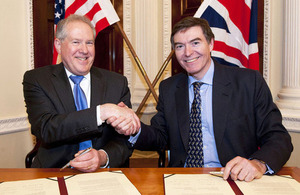International science collaboration agreed
UK and US ministers have announced plans to boost science and technology collaboration.

UK defence minister Philip Dunne (right) signs a communiqué with US defence minister Frank Kendall [Picture: Crown copyright]
Defence ministers on both sides of the Atlantic have committed to enhance science and technology collaboration, develop joint programmes of research and strengthen engagement between industry and academia.
In the first formal science agreement, UK defence minister Philip Dunne and US defence under secretary Frank Kendall agreed collaboration on:
- cyber security
- space research, knowledge and capabilities
- energy use and consumption
The 2 countries have also agreed to build upon existing high-profile science and technology projects, including next-generation aircraft, counter-terrorism, force protection, and chemical and biological defence.
The US and UK are already each other’s largest international research partner.
Speaking about the agreement, Philip Dunne said:
There is no doubt that science and technology will matter even more in the future than it has in the past.
Technological innovation is vital if we are to protect our battle-winning edge – which is why the UK has protected annual investment in science and technology at a minimum of 1.2% of the defence budget.
This enhanced collaboration will ensure that our work is smarter and delivers more effectively for both nations.
These agreements are underpinned by 3 strategic priorities for co-operation that maintain capability advantage and interoperability, improve mutual financial benefits through burden-sharing, and support economic growth through innovation.
Work is being progressed by the chief scientific advisers for both nations, and they will retain oversight of the enhanced programme.
Professor Vernon Gibson, the UK’s defence chief scientific adviser, said:
We are 2 of the greatest scientific nations and our defence and security scientists and laboratories have developed strong bonds from so many years working successfully together.
Through close co-operation with my opposite number, Al Shaffer, we will ensure the effective and efficient co-ordination of world-class facilities.
I am looking forward to getting started, building on our existing programme of collaborations, whilst accelerating development of new joint programmes in priority areas for defence [in the US and UK] now and in the future.